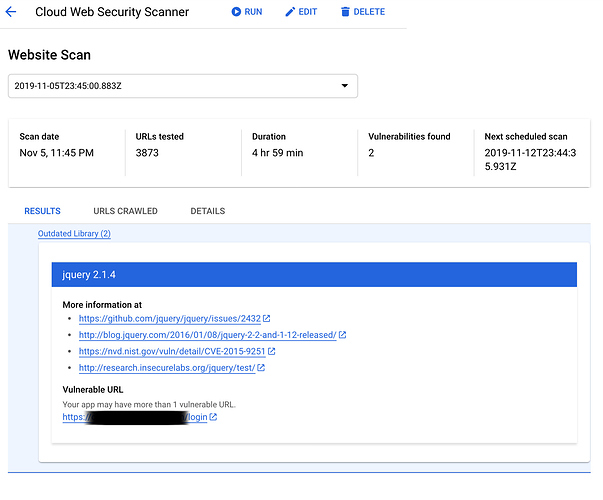[/details]
Nextcloud version 17.0.0:
Operating system and version Debian 10:
Apache or nginx version nginx/1.14.2:
PHP version 7.3.11-1~deb10u1:
The issue you are facing:
I recently setup Google’s Cloud Web Security Scanner to test all websites hosted in my environment. After the first run I got a notification that the version of jquery used on the login page for Nextclould seems to be quite old, jquery 2.1.4. See the below screen shot for the full message.
Basically, I am wondering if this is an actual issue or if I have somehow configured my Nextcloud configuration incorrectly. I set this installation up on NC 13 I think, following the upgrade path to the current release. I have continued to keep my NGINX setup as described in: https://docs.nextcloud.com/server/latest/admin_manual/installation/nginx.html#nextcloud-in-the-webroot-of-nginx. I realize this could be a legacy library that was not removed during one of my upgrades, but would appreciate steps to safely remove or test for that as this is a production system.
I found this github issue: https://github.com/nextcloud/server/issues/6720 but it looks like nothing was closed out with that one. I also found this mention of versions https://github.com/nextcloud/server/issues/4628 and it looks like that was added to a backlog queue so if that is what I should watch please let me know!
Is this the first time you’ve seen this error? Y:
Steps to replicate it:
- Add server URL to Google Cloud Web Security Scanner.
- Wait for scan to finish.
The output of your config.php file in /path/to/nextcloud (make sure you remove any identifiable information!):
<?php
$CONFIG = array (
'instanceid' => '',
'passwordsalt' => '',
'secret' => '',
'trusted_domains' =>
array (
0 => '',
),
'datadirectory' => '',
'overwrite.cli.url' => '',
'dbtype' => 'mysql',
'version' => '17.0.0.9',
'dbname' => '',
'dbhost' => '',
'dbport' => '',
'dbtableprefix' => 'oc_',
'dbuser' => '',
'dbpassword' => '',
'logtimezone' => 'America/Los_Angeles',
'installed' => true,
'mail_from_address' => 'nextcloud',
'mail_smtpmode' => 'smtp',
'mail_domain' => '',
'maintenance' => false,
'memcache.local' => '\\OC\\Memcache\\Redis',
'redis' =>
array (
'host' => 'localhost',
'port' => 6379,
'timeout' => 0.0,
),
'memcache.locking' => '\\OC\\Memcache\\Redis',
'updater.release.channel' => 'stable',
'theme' => '',
'loglevel' => 0,
'log_rotate_size' => 209715200,
'mail_smtpauthtype' => 'LOGIN',
'mail_smtphost' => '',
'mail_smtpport' => '',
'knowledgebaseenabled' => false,
'trashbin_retention_obligation' => 'auto, 30',
'enable_previews' => true,
'mail_smtpsecure' => 'tls',
'mail_sendmailmode' => 'smtp',
'mail_smtpauth' => 1,
'mail_smtpname' => '',
'mail_smtppassword' => '',
'mysql.utf8mb4' => true,
'allowNightlyUpdates' =>
array (
0 => 'passwords',
),
'app_install_overwrite' =>
array (
0 => 'ocsms',
),
);
The output of your Apache/nginx/system log in /var/log/____:
Can attach if needed.
